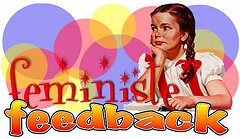
A reader writes in:
Dear Feministe,
I am wondering if you would like to do a post for commenters to suggest resources for unlearning racism and the construction of whiteness. I’ve never taken sociology or women’s studies and I feel I should read a lot more in this area.
Suggestions? Ideas? Post in the comments.
And if you have a question for Feministe Feedback, send it to Feministe@gmail.com.